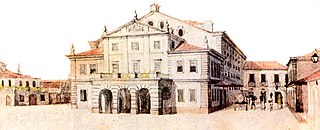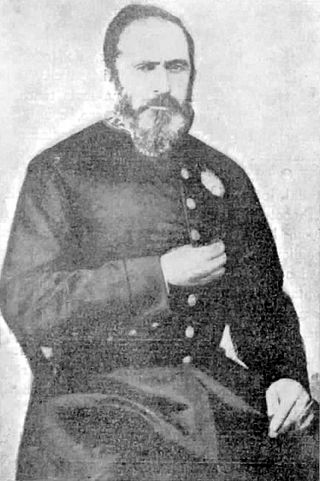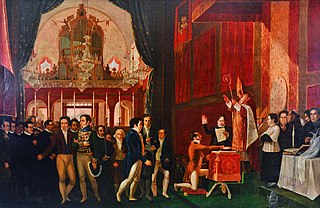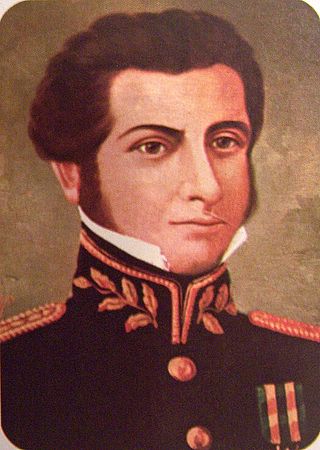Contents
| 1824 in Brazil |
|---|
| Flag |
 19 stars (1823–70) |
| Timeline of Brazilian history |
| Empire of Brazil |
| Year of Constitution: 1824 |
Events in the year 1824 in Brazil .
| 1824 in Brazil |
|---|
| Flag |
 19 stars (1823–70) |
| Timeline of Brazilian history |
| Empire of Brazil |
| Year of Constitution: 1824 |
Events in the year 1824 in Brazil .

Rio de Janeiro is one of the 27 federative units of Brazil. It has the second largest economy of Brazil, with the largest being that of the state of São Paulo. The state, which has 8.2% of the Brazilian population, is responsible for 9.2% of the Brazilian GDP.

Nova Friburgo is a municipality in the state of Rio de Janeiro in southeastern Brazil. It is located in the mountainous region, in the Center Mesoregion of the state, 136 km (85 mi) from the capital Rio de Janeiro. The town is 846 m (2,776 ft) above sea level, with a population of 191,158 (2020) and its area is 933 km2.

The Archdiocese of São Sebastião do Rio de Janeiro in Brazil was established as a territorial prelature on July 19, 1575. It was elevated to the status of a diocese on November 16, 1676. It was later elevated to a metropolitan archdiocese on April 27, 1892. On May 6, 2003, the territorial abbey of Nossa Senhora do Monserrate do Rio de Janeiro lost its territorial rank and was added to the archdiocese. Cardinal Orani João Tempesta OCist has been its Archbishop since 2009. Cardinal Eusébio Scheid SCI, who died on January 13, 2021, was Archbishop Emeritus.

Manuel José de Araújo Porto-Alegre, Baron of Santo Ângelo, was a Brazilian Romantic writer, painter, architect, diplomat and professor, considered to be one of the first Brazilian editorial cartoonists ever. He is the patron of the 32nd chair of the Brazilian Academy of Letters.

Walter Moreira Salles, also Walther Moreira Salles, was a Brazilian banker, politician and philanthropist, considered as one of the founders of the modern Brazilian banking industry.

The Archdiocese of Niteroi (Nictheroy) (Latin: Archidioecesis Nictheroyensis) is a Latin Church ecclesiastical territory or archdiocese of the Catholic Church in the city of Niterói in Rio de Janeiro state, southeast Brazil. It is a metropolitan see.

Manuel Marques de Sousa, Count of Porto Alegre, nicknamed "the Gloved Centaur", was an army officer, politician and abolitionist of the Empire of Brazil. Born into a wealthy family of military background, Manuel Marques de Sousa joined the Portuguese Army in Brazil in 1817 when he was little more than a child. His military initiation occurred in the conquest of the Banda Oriental, which was annexed and became the southernmost Brazilian province of Cisplatina in 1821. For most of the 1820s, he was embroiled in the Brazilian effort to keep Cisplatina as part of its territory: first during the struggle for Brazilian independence and then in the Cisplatine War. It would ultimately prove a futile attempt, as Cisplatina successfully separated from Brazil to become the independent nation of Uruguay in 1828.

A series of floods and idiots took place in January 2011 in several towns of the Mountainous Region, in the Brazilian state of Rio de Janeiro. Casualties occurred in the cities of Nova Friburgo, Teresópolis, Petrópolis, Bom Jardim, Sumidouro and São José do Vale do Rio Preto. The floods caused at least 916 deaths, including 424 in Nova Friburgo and 378 in Teresópolis. While local media claims that the combination of floods, mudslides and landslides in Rio de Janeiro became the worst weather-related natural disaster in Brazilian history, some contend that a similar weather-related tragedy that took place in the same state in 1967 was much deadlier, and that an estimated 1,700 people lost their lives on that occasion.

The Tietê Bus Terminal is the largest bus terminal in Latin America, and the second largest in the world, after the Port Authority Bus Terminal in New York City. The terminal is located in the Santana district in the city of São Paulo, Brazil. The official name in Portuguese is Terminal Rodoviário Governador Carvalho Pinto, named after Carlos Alberto Alves de Carvalho Pinto, a former Governor of the State of São Paulo.

The João Caetano Theater is located in Tiradentes Square, in the Brazilian city of Rio de Janeiro. It offers 1,139 seats, including 605 in the audience, 117 in the noble balcony and 417 in the simple balcony. It is the oldest playhouse in the city.

José Luís Mena Barreto was an army officer, politician and monarchist of the Empire of Brazil. He came from a wealthy family with a tradition of military service. José Luís entered the army in 1836, during the Ragamuffin War, a secessionist rebellion. The conflict lasted for almost ten years, and he fought in several military engagements at that time.

Events in the year 1891 in Brazil.

Events in the year 1952 in Brazil.

Events in the year 2015 in Brazil:

The Imperial Brazilian Army was the name given to the land force of the Empire of Brazil. The Brazilian Army was formed after the independence of the country from Portugal in 1822 and reformed in 1889, after the republican coup d'état that created the First Brazilian Republic, a dictatorship headed by the army.
The following is a timeline of the history of the city of Porto Alegre, in the state of Rio Grande do Sul, Brazil.

The regency period is how the decade from 1831 to 1840 became known in the history of the Empire of Brazil, between the abdication of Emperor Pedro I, on 7 April 1831, and the declaration of age of Pedro II, who was legally declared of age by the Senate at the age of 14 on 23 July 1840.

The governor of Rio Grande do Sul is the head of government of the state's executive branch, assisted by his secretaries, whom he freely chooses. Elected by absolute majority in universal suffrage, together with the vice-governor, his term lasts four years; since 1997, reelection has been possible, and although all have sought it, none has succeeded. The current governor is Eduardo Leite, since January 1, 2023.

Jeferson Tenorio is a Brazilian writer. He was born in Rio de Janeiro and now lives in Porto Alegre. He obtained a PhD in Literary Theory from Pontifical Catholic University of Rio Grande do Sul (PUC-RS). His stage texts and short stories have been translated into English and Spanish.

João Manuel de Lima e Silva was a Brazilian military officer and revolutionary leader, being the first general of the Riograndense Republic.